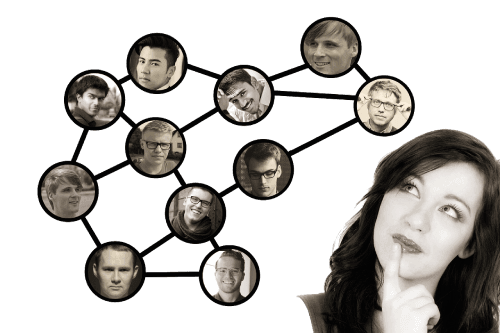How to Choose a Life Coach
If you’re new to life coaching, you’re probably wondering …
… How do I choose a life coach to ensure that there is a great match between us?

This is an important question.
Here, we offer some advice on choosing the coach who is a great match for you and thereby ensuring you get the best value for your investment!
The following article was written by Bill Burridge, CEO of New Insights. In it, he suggests you consider and apply four simple ‘filters’ to assist you in making your choice.
Demographic matching
The first and relatively easy step is what I call
“matching the demographics”.

If you’re set on face-to-face coaching then you’ll need someone who you can reach within a reasonable traveling distance.
Now, before I move on, let me assure you that being coached remotely (Zoom and Skype are both very popular applications for those with broadband internet because they are free services) is an option that you should not discount lightly.
Believe it or not, there are many benefits to being coached remotely – but that’s a topic for a separate article.
If you work best with people of your own – or the opposite – gender, then this too will influence your choice.
There are many excellent and vibrant young coaches around but you may feel uncomfortable with having a coach who is half your age. Alternatively, as a young person, you might prefer to have a coach that has extensive life experience to draw on; someone who’s been there and done that!
Coaching fees come into the equation too, of course. But, if at all possible, I would encourage you not to restrict the field by applying this filter right up front.
Look past the advertised fees if you can, and find your best match using the steps I outline in this article. Then, if necessary, try negotiating with your preferred coach to fit your budget.
Many coaches are negotiable on fees and some will offer a substantial discount for payment in advance for a full programme of coaching.
My advice is to consider what you will pay for the full programme of coaching. Don’t stint on time. Coaching that is genuinely transformational in nature can take six or seven months and anything from 10-20 sessions.
Now do a little cost-benefit analysis. Imagine transforming your life, finding your life purpose and/or achieving a very important goal? How does the value of this compare with your investment in coaching?
If you’re like most people with reasonably big personal aspirations, the investment decision should be a ‘no-brainer’!
Niche matching
The next step is more difficult. I call it
“matching the niche”.

Let me ask you this. If you own a house that’s built out of timber and perched on the side of a steep hill and you decide to add an extension with an overhanging deck, who would you be more likely to contract with?
… A general builder, or a builder who specialises in timber homes and cantilevered decking?
When you hire a life coach, it is likely that you will have a good idea about what you want to achieve or what part of your life you specifically want to focus on improving. And it may well be that you’ll find a life coach whose ‘niche’, or coaching speciality, matches your needs perfectly.
I recommend to all coaches who want to build substantial, self-sustaining practices that they choose a niche market based on their underlying skills and passionate interests.
I know of life coaches who have been very successful focusing on niches like ‘personal empowerment’, ‘intimate relationships’, ‘self-confidence’, ‘youth development’, ‘career building’, ‘retirement’, ‘financial freedom’, ‘childbirth’, and so on and so on.
Skills matching
The third filter to apply is what I like to call:
“matching the skills”

Once you’ve decided on a rough demographic profile for your ideal coach and the niche (if any) that you fall into, you can consider the level of skill that your ideal life coach should have.
Now, remember that there is, at least currently, no form of statutory regulation governing the life coaching ‘profession’ unlike that you would find in the medical and counselling professions for example.
In one sense this is a good thing because there are no barriers to entry into an industry where having a passion for people and a gift for helping others achieve their dreams is far more important than a raft of academic qualifications.
But, on the other hand, it can also be a bad thing. Any Tom, Dick or Harriet can write ‘life coach’ on their business card and set themselves up in practice without having the necessary self awareness, knowledge, skills, techniques, experience and structure to underpin their coaching.
Good quality life coaches are those that deliver outstanding results for their clients. Put another way, a coach is either really effective at helping his or her clients transform their lives – or not! It’s as simple as that.
Without word-of-mouth endorsements and client testimonials, life coaches cannot survive in the field for long.
So my point is this. Always ask any prospective coach for testimonials or references – and check them out.
You can also ask the coach where, and in what methods, they have been trained. Ask to see a certificate and do some research on the coach training provider to see if they are reputable.
Finally, check how authentically passionate the life coach is about their calling. Do they subscribe to any code of ethics? Are they registered with any body that promotes ongoing professional development?
Vibrational matching
The final filter to apply is what I call
“matching the vibration”.

To my mind this is the most important filter of all.
Choosing the ‘right’ (as opposed to ‘good’) coach is, arguably, a more important decision than choosing the ‘right’ doctor or dentist.
Whereas a ‘good’ doctor will make the correct diagnosis and prescribe effective medication without necessarily doing it in a way that has you warming to him or her, a ‘good’ coach (i.e. a well trained, equipped and ethical coach) with whom you are unable to build a great rapport, will be unlikely to do much for you.
Rapport is vital to the coaching relationship.
Establishing an emotional bond with your coach, based on mutual appreciation and respect, trust, and belief in each other, is the foundation for the achievement of great things together.
Great life coaches have that something special that allows them to empower and challenge their clients to go well beyond their comfort zones and, at the same time, remain caring and compassionate.
How do you establish whether there’s a ‘vibrational match’ with your coach?
Great coaches worth their salt will offer a free first session. This may range from a basic introductory session to a full blown goal-setting session in some cases.
This is an ideal, low-risk opportunity to see if you and your coach are a great match!
Coaches need coaches
A final thought …
If you’ve ever doubted the power of life coaching, think about this:
Every great coach will tell you that the one thing crucial to their success is having their own personal coach! So why not ask your prospective coach who they are being coached by!
So there you have it.
Good luck as you look to choose the life coach just perfect for you!
